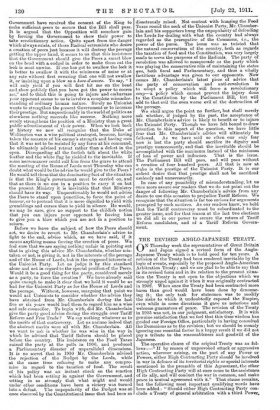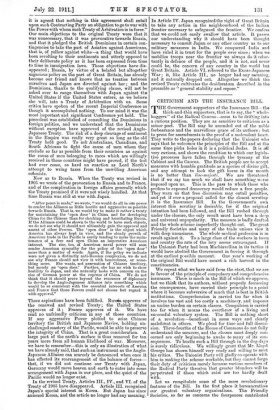THE REVISED ANGLO-JAPANESE TREATY.
ON Thursday week the representatives of Great Britain and Japan signed a revised form of the Anglo- Japanese Treaty which is to hold good for ten years. A revision of the Treaty had been rendered inevitable by the logic of events, especially by the proposed Anglo-American Arbitration Treaty ; and we are glad to be able to say that in its revised form and in its relation to the present situa- tion the Treaty is not open to the objections which we strongly urged against it when it was originally contracted in 1902. When once the Treaty had been contracted more harm than good would have been done by denounc- ing it; the only task for statesmen was to modify the risks to which it undoubtedly exposed the Empire, even while in some directions it gave us notorious and welcome guarantees of peace. The revision of the Treaty in 1905 was not, in our judgment, satisfactory. It is with genuine satisfaction that we feel that this time wisdom has guided our Foreign Office, particularly in having consulted the Dominions as to the revision ; but we should be meanly ignoring one essential factor in a happy result if we did not pay a tribute to the reasonableness and goodwill of the Japanese. The operative clause of the original Treaty was as fol- lows If by reason of unprovoked attack or aggressive action, wherever arising, on the part of any Power or Powers, either High Contracting Party should be involved in war in defence of its territorial rights or special interests mentioned in the preamble of this Agreement, the other High Contracting Party will at once come to the assistance of its ally, and will conduct the war in common, and make peace in mutual agreement with it." That clause remains, but the following most important qualifying words have been added : "Should either High Contracting Party con- clude a Treaty of general arbitration with a third Power, it is agreed that nothing in this agreement shall entail upon such Contracting Party an. obligation to go to war with the Power with whom such Treaty of Arbitration is in force." Our main objections to the original Treaty were that it was unnecessary, that it was provocative towards Russia, and that it pledged the British Dominions in certain con- tingencies to take the part of Asiatics against Americans, that is, of yellow against white—a thing that would have been revolting to their sentiments and utterly opposed to their deliberate policy as it has been expressed from time to time in immigration laws. Those objections have dis- appeared; Russia, by virtue of a belated but altogether sagacious policy on the part of Great Britain, has already become our friend and knows that no treaties between ourselves and Japan are directed against her ; and the Dominions, thanks to the qualifying clause, will not be asked ever to range themselves with Japan against the United States if the United States enters, as we believe she will, into a Treaty of Arbitration with us. Some critics have spoken of the recent Imperial Conference as though it accomplished nothing. To our mind it was the most important and significant Conference yet held. The precedent was established of consulting the Dominions in foreign politics, and we understand that the Dominions without exception have approved of the revised Anglo- Japanese Treaty. The risk of a deep cleavage of sentiment in the Empire was really very great so long as the old Treaty held good. To ask Australians, Canadians, and South Africans to fight the cause of men whom they exclude so far as possible from their countries as against the cause of men belonging to races which are willingly received in. those countries might have proved, if the tea bad ever come, as hard an exaction as Lord North's attempt to wring taxes from the unwilling American colonists.
Now as to Russia. When the Treaty was revised in 1905 we wrote of the provocation to Russia and to France, and of the complication in foreign affairs generally which the Treaty promised if it were not wisely handled. At that time Russia was still at war with Japan.
"After peace is made," we wrote, "we would do all in our power to render the Alliance as little hostile and aggressive as possible towards Russia. That is, we would try to make it rather a treaty for maintaining the 'open door' in China and for developing China for the Chinese than for checking and humiliating Russia. If the Alliance could be shown to the world to have such objects, we do not see why it should not ultimately gain the approval and assent of other Powers. The 'open door' is the object which America has always kept in view, and the steady growth of American trade in the Pacific is surely tending to make the main- tenance of a free and open China an imperative American interest. The rise, too, of American naval power will soon render American sympathy for the policy of the 'open door' more than a matter of words. Again, if the policy we indicate were not given a distinctly anti-Russian complexion, we do not see why France should not view it with benevolence, or some- thing more. She wants, not annexation of Chinese territory, but merely an 'open door.' Further, she has no wish to show hostility to Japan, and she naturally looks with concern on the rise of German power at the expense of China. We do not think that it should prove beyond the resources of diplomacy to develop the Anglo-Japanese Alliance into something which would be so consistent with the essential interests of America and France that those Powers could not choose but regard it with approval."
Those aspirations have been fulfilled. Russia approves of the renewed and revised Treaty ; the United States approves of it ; France approves of it. We have read no unfriendly criticism in any of those countries. If any aggressive Power plotted to seize Chinese territory the British and Japanese Navies, holding un- challenged mastery of the Pacific, would be able to preserve the integrity of China. That is a great consideration. A large part of the earth's surface is thus removed for ten years more from all human likelihood of war. Moreover, we have to remember—this is only an illustration of what we have already said, that such an instrument as the Anglo- Japanese Alliance can scarcely be denounced when once it has effected its rearrangement of the balance of forces— that, if we did not continue our Treaty with Japan, Germany would move heaven and earth to enter into some arrangement with Japan in our place, and the quiet of the Pacific would no longer exist.
In the revised Treaty, Articles Ill., IV., and VI. of the Treaty of 1905 have disappeared. Article III. recognized Japan's special interest in Korea. But Japan has since Annexed Korea, and the article no longer had any meaning. In. Article IV. Japan recognized the right of Great Britain to take any action in the neighbourhood of the Indian frontier necessary to safeguard the frontier. We confess that we could not easily swallow that article. It passes our understanding why it should have been thought necessary to consult Japan or any other country as to our military measures in India. We conquered India and have ruled it in trust for the people ever since ; when we mobilize troops near the frontier we always do it reluc- tantly in defence of the people, and it is not, and never could be, the concern of any country in the world but Great Britain. Article VI. referred to the Russo-Japanese War ; it, like Article III., no longer had any moaning, and it naturally dropped out. Altogether we think the revised Treaty cultivates the desideratum described in the preamble as "general stability and repose."







































 Previous page
Previous page